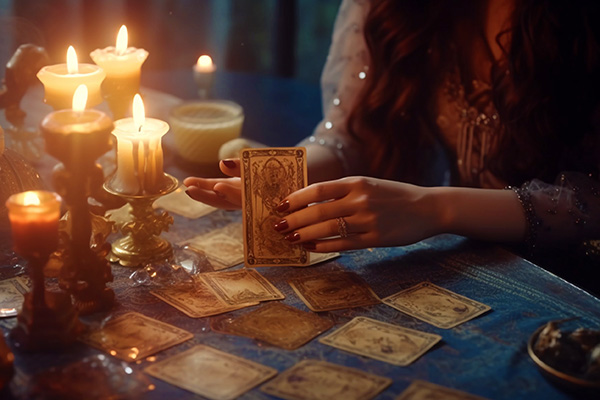Grasping the Timeless Appeal of Tarot Divination
 I have yet to encounter a person with a spiritual orientation who isn’t fond of the Tarot, or at least mildly curious about this iconic set of cards.
I have yet to encounter a person with a spiritual orientation who isn’t fond of the Tarot, or at least mildly curious about this iconic set of cards.
The Tarot is arguably the most esteemed and extensively utilized divination instrument across the globe, celebrated for its profound symbolism and the wealth of understanding it provides. As an ancient esoteric practice that goes back several centuries, the Tarot has transformed into a multifaceted, intricate system of divination employed by individuals from various backgrounds to delve into the enigmas of the mind, spirit, and the future.
In contrast to various other divination methods that may necessitate specialized expertise or instruments, the Tarot is approachable for both novices and experienced users, presenting a distinctive blend of artistry, intuition, mysticism, and narrative. Its adaptability allows it to tackle a broad spectrum of inquiries, ranging from personal and spiritual dilemmas to wider societal matters, making it a preferred source for individuals pursuing guidance, clarity, and self-exploration in an ever-evolving environment.
Each of the 78 cards in a Tarot deck is brimming with symbolic imagery and archetypal meanings that can be interpreted on several levels, ranging from the profoundly psychological to the spiritual and mystical. This rich symbolism enables diviners to investigate personal challenges, spiritual advancement, and the enigmas of existence.
Unlike other divination tools that might depend on more rigid frameworks, Tarot provides a flexible structure that aligns with the reader’s intuition, personal beliefs, and level of psychic talent, making it welcoming to enthusiasts of varied backgrounds and spiritual traditions.
The accessibility and progression of Tarot have played a significant role in its widespread acceptance. Nowadays, there is an abundance of Tarot decks available, each showcasing unique themes, artwork, and interpretations that attract a varied audience. From the classic Rider-Waite deck to contemporary, culturally inclusive interpretations, there’s a deck suited for nearly every preference and concept. Current Tarot features a myriad of unconventional themes that resonate with modern interests and subcultures.
The Tarot aids you in navigating whatever lies ahead in the most advantageous manner ~ Mary K. Greer
These decks exemplify how Tarot can be personalized to resonate with diverse interests, making the practice more engaging and tailored for a contemporary audience. A notable example is the Cat Tarot, where every card includes whimsical and animated illustrations of cats that embody the meanings of traditional Tarot archetypes. This deck introduces a playful and cheerful approach to readings, appealing to feline enthusiasts who seek a familiar and enjoyable way to interact with the Tarot.
Another illustration is the Tarot of the Silicon Dawn, offering a more avant-garde interpretation, combining futuristic, cyberpunk aesthetics with traditional Tarot symbolism. This deck includes non-conventional cards and integrates modern themes of technology, science fiction, and postmodern philosophy, appealing to those captivated by the blend of Tarot and the contemporary digital landscape.
Moreover, the advent of digital technology has rendered Tarot more accessible than ever, with online readings, applications, and communities linking aficionados across the globe. This versatility and relevance to today’s spiritual and psychological requirements guarantee that Tarot will persist as a favored tool for divination and personal evolution.
Narrative & Self-Exploration
Another factor contributing to Tarot’s lasting popularity is its capacity for storytelling and self-exploration. Tarot readings usually involve crafting a narrative through the arrangement of the cards, forming a story that mirrors the querent’s current circumstances, obstacles, and potential future directions.
This narrative element transforms Tarot into not just a divination tool, but also a means for examining one’s internal landscape, fostering self-awareness and introspection. In an increasingly intricate world, individuals are searching for tools to help them make sense of their experiences, and Tarot provides a structured yet adaptable way to delve into the self and navigate life’s unpredictability.
Historically, Tarot tends to gain traction during periods of tremendous transformation on Earth. During times of uncertainty, turmoil, and societal transition, many individuals turn to the Tarot for clarity and guidance when the future appears uncertain. During such eras, people often seek meaning and understanding beyond society’s conventional explanations.
For instance, during the 1960s, amid the hippie movement and the emergence of American counterculture, there was a noticeable increase in tarot deck purchases. Similarly, at the dawn of the new millennium, there was also a striking rise in tarot deck sales, with individuals from various backgrounds acquiring them. It is during these transformative periods that humanity experiences significant growth, new perspectives, and shifts that accelerate our evolution.
Tarot delivers a symbolic language through which people can navigate their emotions, fears, and aspirations, offering a structured yet instinctive method for managing change. The cards inspire self-reflection and provide a basis for contemplating life’s intricacies, helping individuals discover inner resilience and direction. Additionally, Tarot readings can offer solace by suggesting possible outcomes or unveiling hidden influences, granting individuals a heightened sense of agency and perspective in circumstances where they might otherwise feel powerless.
Tarot continually whispers to you. Tarot intertwines truth, tales, mysteries, and narratives. All that’s needed is to pause and listen ~ Sasha Graham
Flexibility & Results
Another appealing aspect of the Tarot is its diverse usability. You can turn to the cards for deeper insights into nearly any topic utilizing a variety of spreads and reading styles. There are numerous card layouts that yield deeper and wider meanings depending on where the card falls within the arrangement. For instance, the classic Celtic Cross remains one of my favorite spreads as it provides a comprehensive overview of the sitter’s life encompassing multiple themes. Yet, the straightforward three or five card spread can effectively concentrate on answers to a specific inquiry while revealing hidden influences, advice, and potential future scenarios.
The interpretation of cards located in the “outcome” position within a spread can significantly help in honing our energy and intentions to reach our desired objectives. Outcomes aren’t predetermined. We are presented with various choices in life, and Tarot can assist us in connecting with aspects of ourselves that may be obscured by the views of others while unblocking the pathways that have led us away from our intuition and spiritual insight.
The outcome card thus unveils the unknown and assists us in recognizing our current path and what is likely to happen if we remain on that trajectory. It’s our responsibility to determine if it aligns with our desires. Should the outcome card be unsatisfactory, I recommend drawing a ‘clarity’ card to gain guidance on altering that result.
The Universe will consistently guide us towards what serves our highest good. The lesson is to heed and follow the guidance that the cards provide. This necessitates selecting a competent reader. Choose a tarot reader with whom you feel at ease and capable of communicating openly.
The manner in which some readers interpret the cards is also noteworthy. In certain ancient texts and languages, words were traditionally read from right to left. However, there are Tarot readers who prefer interpreting the cards in this manner as well.
There’s no definitive right or wrong approach to reading the Tarot, and while there are general meanings attributed to cards, trust your instincts when you observe them. Pay attention to the colors. Are they predominantly solar or lunar? Does an object catch your attention? Your interpretation is paramount and will start forming your distinctive psychic lexicon for each card.
Framework & Symbolism
A conventional Tarot deck comprises 78 cards. The initial 22 cards are known as the Major Arcana. Arcana is derived from Latin, signifying “hidden knowledge” or “sacred information.” These first 22 cards are deemed more crucial in a reading, symbolizing the 5th element, which is Spirit.
The remaining four suits are affiliated with the other four elements, generally referred to as the Minor Arcana, which constitute the remaining 56 cards in the deck. The four suits in traditional decks are Swords (Air), Wands (Fire), Cups (Water), and Pentacles (Earth). The tools and their names can differ from deck to deck. For instance, wands can be known as batons or staffs, cups may appear as goblets, and I’ve seen pentacles depicted as discs, shields, or coins. Some decks simply use the name of the element itself, like “Two of Fire” for the Two of Wands.
Numerous books have been authored about Tarot. Some of the most insightful are by writer and educator Mary K. Greer. It’s beneficial to have a foundational understanding of possible card meanings and their symbology. Symbology works in tandem with our Spirit Guides, allowing us to cultivate our own psychic dictionary of symbols as we develop a new language for communicating with Spirit through the Tarot.
The symbols present on the cards are believed to open pathways to the divine. There is an abundance of understanding about the brain and the mind that remains undiscovered by science. The intuitive and subconscious minds are accessed through the imagery on the cards. A picture holds immense value. Therefore, by learning Tarot, you are essentially awakening dormant areas of the mind and connecting with a higher intelligence.
Bear in mind that Tarot is a significant and sacred arcanum – its misuse is a desecration internally and a folly externally. It serves purposes far beyond determining when the tall dark man will cross paths with the fair rich widow ~ Jack Parsons
Choice & Maintenance
To begin, you’ll want to select a deck that is straightforward to learn, such as the 1909 Rider-Waite-Smith deck. Rider was the initial London publisher, Arthur Edward Waite created the deck, and Pamela Coleman Smith, known as “Pixie,” was the artist. The Rider-Waite-Smith deck is the most commonly used deck globally. Many decks created later have replicated the artwork, making it an excellent introductory deck. Once you’re comfortable, you can explore other decks that resonate with you. This is an intuitive journey; try not to overanalyze it. Sometimes someone will even gift you a deck that holds special significance!
There are diverse options for storing your deck, along with various tarot carrying cases. If you intend to take your deck with you, options such as drawstring and Velcro covers available in many patterns and sizes await. Some believe that keeping your deck wrapped in black silk can preserve its magical energies, while others prefer storing it in its original box. How you choose to store your deck is completely personal.
When purchasing a deck, I enjoy consecrating it and harmonizing it with my energy. I do this by applying a small amount of patchouli or frankincense oil to my hands. Afterwards, I spread the cards out on the floor and gently press my hands over the cards, imbuing them with the oils and a blessing.
I request that the cards align in perfect harmony with me and serve the highest good of anyone I read for. I also ask for a protective seal and for the cards to end up only in the hands of those who will use them with good intentions and in the spirit of holy truth.
After aligning the cards with my energy, consecrating and blessing them, I place the deck against my heart and lightly tap its top three times to clear and awaken the cards. After that, I am ready to commence!
Tarot can be utilized not only to gather clarity and insight into any situation but also as a reflective tool for spiritual growth. There’s a saying that the Tarot has been left to us as a guide to enlightenment. I have been reading the cards for over 25 years and have discovered that one can never exhaust the depth of Tarot, as it continues to evolve alongside you.
|
Known as The Psychic’s Psychic, since 1998, Isadora has provided readings for thousands globally, with notable clients including individuals from the Obama administration, Fortune 500 CEO’s, and distinguished personalities in Hollywood. Her remarkable (Gemini) precision is simply astounding, as she perceives individuals at the Soul Level and delivers clear answers on various topics, from relationship issues, business decisions, to past lives, etc.—anything needing specific answers and incisive insight. She has the knack for spotting hidden patterns that underlie your present situation, granting you information to positively alter your future. For a reading with this empathetic, straightforward, laser-accurate, and dedicated Psychic, visit Isadora at PsychicAccess.com. |
Comprehending the Timeless Charm of Tarot Divination
Tarot divination, the art of employing a deck of cards to glean insights into the past, present, and future, has enchanted individuals for centuries. Despite its mysterious roots and frequently misconstrued reputation, tarot divination remains an immensely attractive option for those seeking direction, self-exploration, and spiritual connection. In this article, we will delve into the timeless intrigue of tarot divination and highlight its ongoing relevance as a tool for personal growth and exploration.
Historical Foundations and Symbolism
The inception of tarot divination can be traced back to the 15th century in Europe, where the cards were originally utilized for gaming. Nonetheless, it wasn’t until the 18th century that the tarot deck became linked with divination and esoteric practices. The deck is made up of 78 cards, categorized into two main groups: the Major Arcana and the Minor Arcana.
The Major Arcana, comprising 22 cards, symbolizes significant life events, archetypes, and spiritual teachings. Every card is infused with symbolism, showcasing various figures, animals, and objects that convey profound meaning. The Minor Arcana, akin to a regular deck of playing cards, contains four suits: Cups, Pentacles, Swords, and Wands. These cards illustrate more commonplace elements of life, such as emotions, financial matters, intellect, and creativity.
The lasting charm of tarot divination resides in the intricate symbolism of the cards. Each card narrates a story, and the reader interprets the meanings of the cards based on their positioning in a spread and their relations to each other. This process allows individuals to access their intuition and derive insights concerning their lives, relationships, and personal development.
Self-Discovery and Personal Advancement
One of the primary reasons tarot divination continues to entice individuals is its potential to promote self-exploration and personal growth. Tarot readings offer a unique opportunity for individuals to probe into their subconscious thoughts, emotions, and aspirations. By reflecting on the symbolism and messages found within the cards, individuals can attain a profound understanding of themselves and their circumstances.
Tarot divination motivates individuals to pose significant questions and face their fears, hopes, and ambitions. It acts as a mirror, reflecting the concealed aspects of one’s psyche, facilitating introspection and self-discovery. Through this experience, individuals can achieve clarity, make enlightened choices, and navigate life’s difficulties with increased confidence.
Spiritual Connection and Intuition
Tarot divination also attracts those in search of a deeper spiritual bond. Many practitioners perceive that the cards act as a medium for divine counsel or heightened wisdom. Whether one follows a specific deity, interprets the cosmos, or simply trusts in intuition, tarot divination can foster a sense of connection to something transcendent.
The act of shuffling and selecting cards from the deck is regarded as a sacred routine, inviting spiritual energies to assist the reading. Tarot readers often cultivate their unique bond with the cards, developing a cooperative relationship that enhances their intuitive capacities. This connection enables the reader to instinctively interpret the cards’ messages in a manner that resonates with the seeker.
Community and Connection
Another element that enriches the enduring allure of tarot divination is the sense of community and camaraderie it cultivates. Tarot aficionados frequently unite in groups, online spaces, or workshops to exchange experiences, insights, and knowledge. This communal environment fosters support, allowing individuals to learn from one another, share readings, and deepen their grasp of the cards.
Besides, tarot divination can be a beneficial tool offering guidance and support during challenging moments. Seekers often consult tarot readings for comfort, assurance, and advice when confronted with tough decisions or life transitions. The cards provide a non-evaluative atmosphere for individuals to voice their concerns and receive assistance from a compassionate and objective source.
In summary, the persistent allure of tarot divination stems from its capacity to facilitate self-exploration, personal development, spiritual connection, and community support. The rich symbolism of the cards, combined with the reader’s intuition, allows individuals to glean insights into their lives and make informed decisions. Whether utilized for self-examination or seeking guidance, tarot divination continues to fascinate and inspire individuals on their path of self-discovery and spiritual awakening. Continue reading



